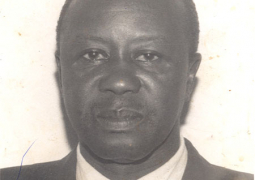The
sisterly relationship between The Gambia and Sierra Leone is not just a product
of the two countries’ foreign relations or their diplomatic ties. It dates back to the colonial days or much
earlier.
But
according to the Sierra Leonean Ambassador to The Gambia, Soulayman Daramy, the
relationship has reached an all-time high.
This
is indeed due to the renewed impetus added to the already cordial relation with
the assumption of Yahya Jammeh as president of The Gambia, and Ernest Bai
Koroma for Sierra Leone.
However,
it is important to note that the relationship does not just start with the
opening of the Gambian and Sierra Leone embassies in Freetown and Banjul,
respectively.
The
relationship is historical, dating back to colonial days or even much earlier –
before the advent of colonialism.
The
former Sierra Leonean Ambassador to The Gambia, Mohamed Kemo Fadika, has aptly
captured that point when he once said: “The bilateral relationship between
Sierra Leone and The Gambia is something historical.
“During
the days of our forefathers, there had already been a very cordial relationship
between Sierra Leone and The Gambia.”
During
the colonial days, The Gambia and Sierra Leone were being administered together
by the British. Since 1816, The Gambia
was ruled under the crown colony system of colonialism with its administration
answerable to the Governor in Sierra Leone.
The
Gambian territory was governed from Sierra Leone from 1821 to 1843 and from
1866 to 1888. When the administration
was attached to that of Sierra Leone in 1866, the Gambian executive and
legislative councils were abolished.
When
the administrative link between The Gambia and Sierra Leone were severed in
1888, The Gambia became a separate colony.
This was how it continued until independence of both countries.
But
even before this period, the two countries had a lot in common. Both countries were and continue to be
inhabited by the same ethnic groups, Mandinka, Fula, Aku among others.
Approximately,
there is more than 6,000 Sierra Leoneans living in The Gambia. Most of them are noted for their educational
achievements, trading activity, entrepreneurial skills, and arts and crafts
work, particularly woodcarving.
A
good number of them will not go back; they only have parental connection to
Sierra Leone but The Gambia is their home.
Sierra
Leoneans easily fit in to the Gambian system and vice versa because the two
countries share almost the same cultural practices such as wedding, funerals,
and naming ceremony. And lifestyles –
respect for women, elders and family unity.
They
also have almost the same level of religious tolerance – relations between Christians
and Muslims; God fearing people in both countries.
Education
has been one of the most pronounced areas of relationship between The Gambia
and Sierra Leone. During the colonial
days and the first republic, the majority of Gambians that received post-secondary
education got it in Sierra Leone. A lot
of senior Gambians did their university education in Sierra Leone.
There
is also commercial relationship. Though
this is not very significant (that is not unique because the same is true for
intra-African trade), Sierra Leone export to The Gambia is mainly textile and
foodstuff like palm oil, ‘gari’, and cola nut, while Gambia’s is mainly textile
(dress) and few manufactured goods.
In
a nutshell, The Gambia-Sierra Leone relation is much deeper and wider than the
diplomatic ties manifested in the foreign policies of both countries towards
each other.
Apart
from Senegal, The Gambia is more connected to Sierra Leone than any country on
earth.
Therefore,
the relationship between the two countries should be revered by both peoples
and be nurtured for it to continue growing from strength to strength.
The
two presidents, aided by their respective ambassadors, are on the right path
for they are cognizant of this deep-rooted relationship, and are doing everything
at the political level to further consolidate it in the interest of both
countries.
“History is filled with tragic examples of
wars that result from diplomatic impasse. Whether in our local communities or
in international relations, the skillful use of our communicative capacities to
negotiate and resolve differences is the first evidence of human wisdom”
Daisaku
Ikeda



